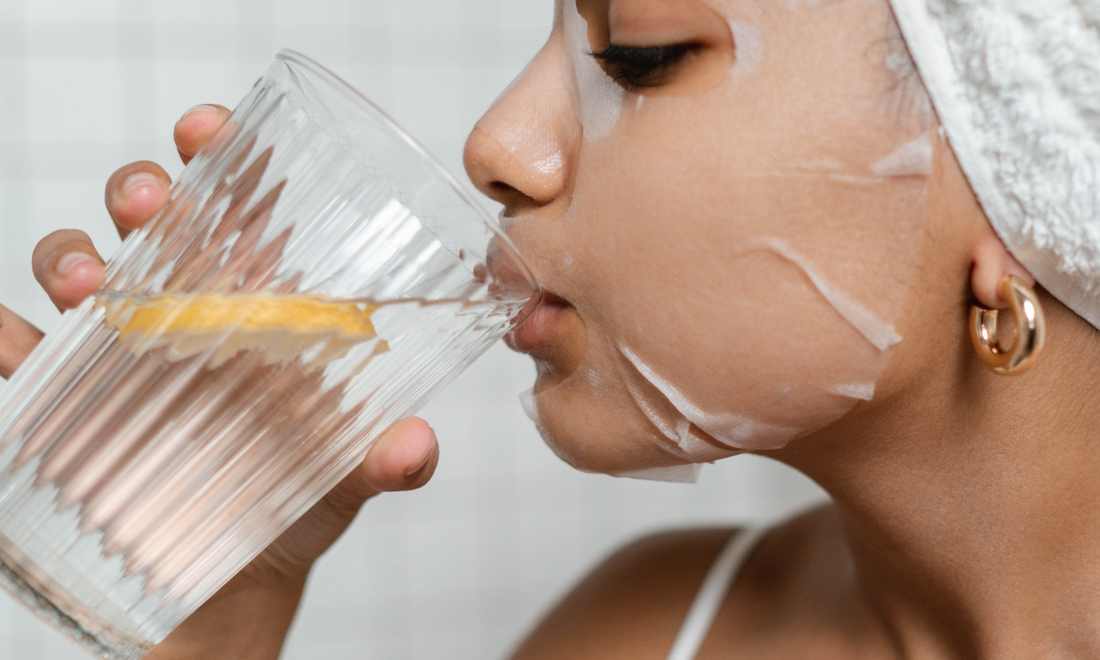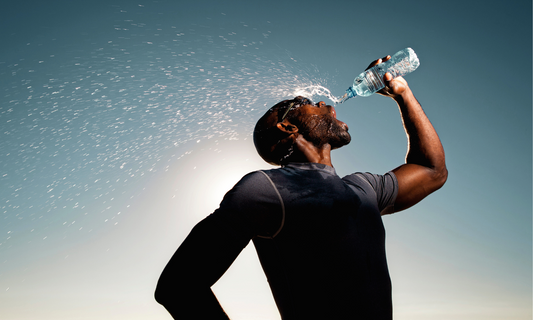The importance of water intake for our health: how to stay hydrated?

Hydration is often cited as one of the essential pillars of a healthy lifestyle. Yet, it remains underestimated in our daily lives. Invisible and easily overlooked, good hydration is nevertheless essential to ensure the proper functioning of the body and mind. But how can you stay hydrated? In this article, we'll guide you through the basics of fluid intake, along with tips for achieving it every day.
What is meant by water intake?

Water intake is the total amount of water we consume daily, whether through drinks or food.
It's important to know that the main sources of water are beverages such as water, tea, coffee, soft drinks, but also fruits and vegetables. In fact, most vegetables contain between 90 and 95% water.
Water needs according to age and lifestyle
Water requirements in adults
For adults, the water requirement is between 2.5 and 3 liters for men and between 2 and 2.5 liters for women. However, this does not mean that this is the amount you should drink, as the fruits and vegetables you eat daily help you meet this requirement.
It is considered that you should drink between 1.5 and 2L of water per day (for women and men respectively), which becomes more achievable. These figures are not fixed, they depend on different factors. The amount of water needed will be influenced by the climate , physical effort and diet . You will therefore need to drink more if you live in a hot climate, if you do sports or if you eat salty or protein-rich foods.
For women, during pregnancy or while breastfeeding, water needs are also greater. During pregnancy, we recommend drinking 1.5L of water per day, in addition to food, and 2L for a woman with a baby to breastfeed.
Water needs in seniors

For seniors , the need to hydrate is just as important. Taking medication, for example, is a factor to take into account and requires increased hydration.
In addition, certain physiological changes affect the hydration of the elderly. Indeed, the risk of dehydration is higher and the sensation of thirst decreases with age. Most of the time, kidney efficiency is reduced and the urge to urinate occurs more quickly. It is therefore necessary to drink more water to compensate for these losses.
Controlled hydration allows you to avoid certain complications such as hypotension/hypertension ,fatigue , kidney problems or even urinary tract infections . It is therefore important to drink water regularly , even if you do not feel thirsty.
The water needs of athletes
During a sporting activity , water intake must be greater, in particular because of perspiration as well as the loss of 1% of body water mass which already has negative effects on sporting performance (this represents approximately 10% less physical and cognitive performance!).
This is why it is recommended to increase your water consumption before exercise and continue to drink around 200 mL every 20 minutes during the activity, supplementing with a drink rich in electrolytes, to provide you with all the essential mineral needs. It is recommended to consume between 500 and 800 mL of water per hour of exercise depending on the weather conditions, your profile, your perspiration, etc. Don't forget, rehydration after the session is essential in order to recover well and replenish your water and electrolyte reserves!
How to properly distribute your water intake throughout the day?
Throughout the day, drinking regularly is key. The goal is to drink at fairly regular intervals even when you're not necessarily thirsty. However, it's recommended to avoid drinking too much water before going to bed so you don't wake up with an urgent need.
The most common mistakes are drinking either too little or too much at once. Feeling thirsty is an indicator that the body is already in a water deficit , so avoid it if possible. In addition, drinking too much can overload the kidneys and thus cause an imbalance of electrolytes in the blood.
To make your hydration effective , you must listen to your body and always have water nearby so that you can drink regularly throughout the day. To make your water consumption easier, you can also vary the different sources of hydration.
Finally,Hydratis lozenges allow you to facilitate your hydration thanks to the different flavors and the electrolytes as well as the trace elements they contain, which are essential on a daily basis.

Calculating your water intake: an estimate adapted to your daily life
There are several methods to help you estimate your necessary water intake . The simplest is a quick calculation: you need to drink about 35 mL of water per kilogram of body mass. Let's take the example of a person weighing 80 kg, who will therefore need 2.8 L per day. If you are exercising, you can add between 500 mL and 800 mL per hour of exercise depending on the intensity. If you wish, you can also visit ouronline hydration diagnosis on our website, where you will find recommendations on the amount of water to consume per day.
There are also apps like Chron'eau or Hydro Coach that can help you track your daily water consumption.
Hydration is important for the proper functioning of our bodies and minds, and there are simple methods available to optimize your water intake. These tools are specific to each individual and will depend on your activity, diet, and age. Therefore, it's important to determine your own daily water needs.
Hydratis is here to help you, thanks to our lozenges which promote optimal hydration in all circumstances!











